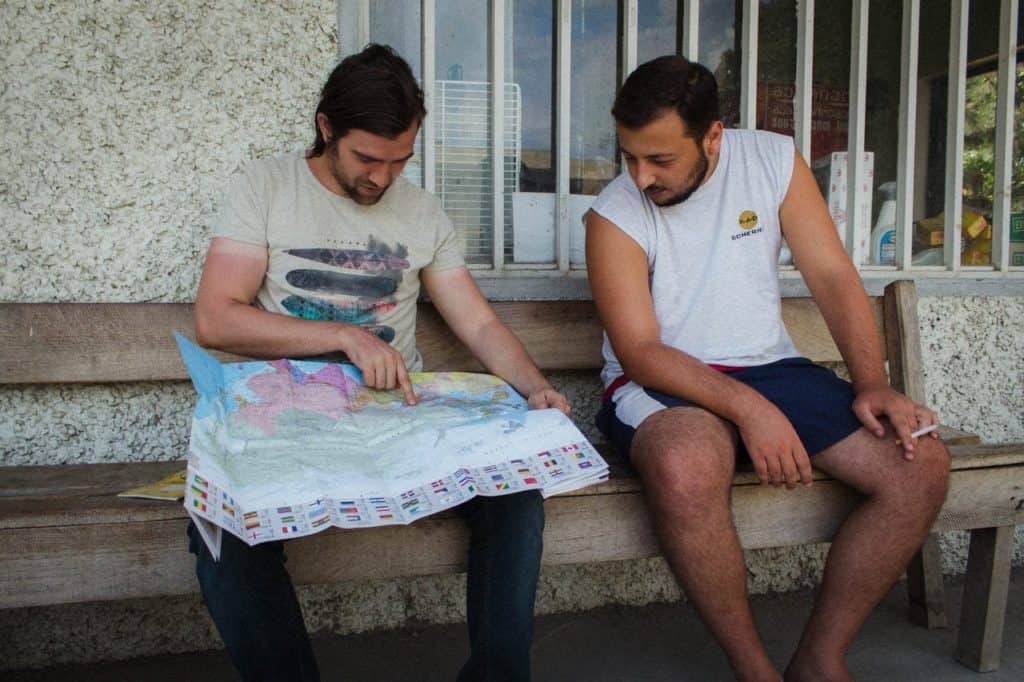Learning Russian can feel like a daunting task, but with the right approach and dedication, significant progress can be made in just three months. This guide outlines a proven methodology, combining effective learning techniques with practical resources, to help you achieve fluency faster. We’ll explore whether it’s truly possible to learn Russian in 3 months and provide actionable steps to maximize your learning potential.
Connecting with locals through Russian enhances travel experiences.
Is Russian Hard to Learn?
The perceived difficulty of learning Russian often depends on prior language experience. Familiarity with Slavic languages like Bulgarian or Czech can provide a head start. Mastering the Cyrillic alphabet is crucial, but skipping it initially can accelerate conversational progress. Russian grammar, with its cases and declensions, presents a unique challenge, but focusing on essential phrases and vocabulary allows for early communication.
How Long Does it Take to Learn Russian?
Fluency estimates for Russian vary widely, but a more accurate measure is learning hours. The Foreign Service Institute suggests 1100 hours for fluency, achievable in a year with dedicated daily study. However, using effective methods and consistent effort, conversational fluency can be attained in 3-4 months.
Factors Influencing Learning Speed
-
Learning Methods: Modern language learning extends beyond the classroom. Online resources like LingQ and Drops, Russian radio, and YouTube series offer engaging learning opportunities. Immersion through travel to Russian-speaking countries significantly accelerates progress.
-
Dedicated Time: Consistent daily study, even in short bursts, proves more effective than infrequent cramming. Two 45-minute sessions daily yield optimal results.
-
Attitude and Motivation: Maintaining enthusiasm is crucial. Engaging learning materials, visual cues, and celebrating milestones like understanding a Russian film help sustain motivation.
Portable learning materials facilitate consistent study.
Memorizing Russian Words Quickly
Effective memorization is key to rapid language acquisition. This five-step technique facilitates transferring words from short-term to long-term memory:
-
Find Audio Material: Utilize Russian movies with English subtitles on YouTube, RussianPod101 lessons, or vocabulary apps like Drops.
-
Write and Transcribe: Pause the audio and write down new words and sentences phonetically, alongside their English translations.
-
Record Yourself: Read your notes aloud and record yourself speaking the new words and phrases.
-
Listen to Recordings: Dedicate 30 minutes daily to listening to your own recordings, reinforcing pronunciation and recall.
-
Repeat: Continue this process daily, gradually reducing the need for transcription as comprehension improves.
Essential Russian Words and Phrases
Mastering basic greetings, polite phrases, and simple questions facilitates early communication:
- Please: Пожалуйста (Pajhalsta)
- Where: Где (Gid-i-yay)
- Thank you: Спасибо (Spassiba)
- How much?: Сколько это стоит? (Skolka eta sto-et?)
- What’s your name?: Как тебя зовут? (Kak tibiya zavut?)
- My name is…: Меня зовут… (Miniya zavut…)
- Goodbye: До свидания (Do svidanya)
Useful Russian Sentences
Learning practical sentences for common situations like finding accommodation, checking into a hotel, and ordering food significantly enhances independence:
- Where’s a hotel?: Где гостиница? (Gid-i-yay gastinitza?)
- I’m looking for a hotel nearby: Я ищу отель поблизости (Ya ishoo otel pablizasti)
- Do you have a room available?: Есть ли в наличии комната? (Yest li v’nalichi komnata?)
- I don’t eat meat: Я не ем мясо (Ya ni-yay yem may-assa)
- Please bring me the menu: Пожалуйста, принесите мне меню (Pajhalsta, pri-ni-si-tiyay menyoo)
Basic Russian phrases enable connection and friendship.
Russian Verbs for Daily Use
Understanding basic verb conjugation is essential. Here’s a simplified overview of common verbs:
| Verb | I | You (informal) | He/She/It | We | You (formal/plural) | They |
|---|---|---|---|---|---|---|
| To Go (Идти – Eetee) | Иду (Ya eedoo) | Идёшь (Ty eedeesh) | Идёт (On/Ona/Ono idet) | Идём (My idyom) | Идёте (Vy idyote) | Идут (Oni idut) |
| To Be Able To (Мочь – Moch) | Могу (Ya mogu) | Можешь (Ty mozhesh) | Может (On/Ona/Ono mozhet) | Можем (My mozhem) | Можете (Vy mozhete) | Могут (Oni mogut) |
| To Speak (Говорить – Govorit’) | Говорю (Ya govoryu) | Говоришь (Ty govorish) | Говорит (On/Ona/Ono govorit) | Говорим (My govorim) | Говорите (Vy govorite) | Говорят (Oni govoryat) |



Best Resources for Learning Russian
Utilizing a combination of books, websites, apps, and online platforms optimizes learning:
-
Books: Lonely Planet Russian Phrasebook, Colloquial Russian, and Golosa provide comprehensive vocabulary, grammar explanations, and practical exercises.
-
Websites and Apps: LingoDeer, Duolingo, Drops, Memrise, and RussianPod101 offer interactive lessons, vocabulary building, and pronunciation practice. italki, Busuu, and Verbling connect learners with native speakers for personalized instruction.
-
YouTube Channels: Learn Russian with RussianPod101, Be Fluent in Russian, and Real Russian Club provide engaging video lessons, cultural insights, and language learning tips.
-
Pimsleur Language Course: This audio-based program utilizes spaced repetition and active recall for effective vocabulary and pronunciation development.
Conclusion
While mastering Russian requires sustained effort, achieving conversational fluency in three months is entirely possible. Combining effective learning techniques like the five-step memorization method with resources like Pimsleur, language learning apps, and online practice platforms maximizes progress. Consistent dedication, immersion through interaction with native speakers, and a positive attitude are key to success. Start learning today and unlock the rich cultural and communicative rewards of speaking Russian.